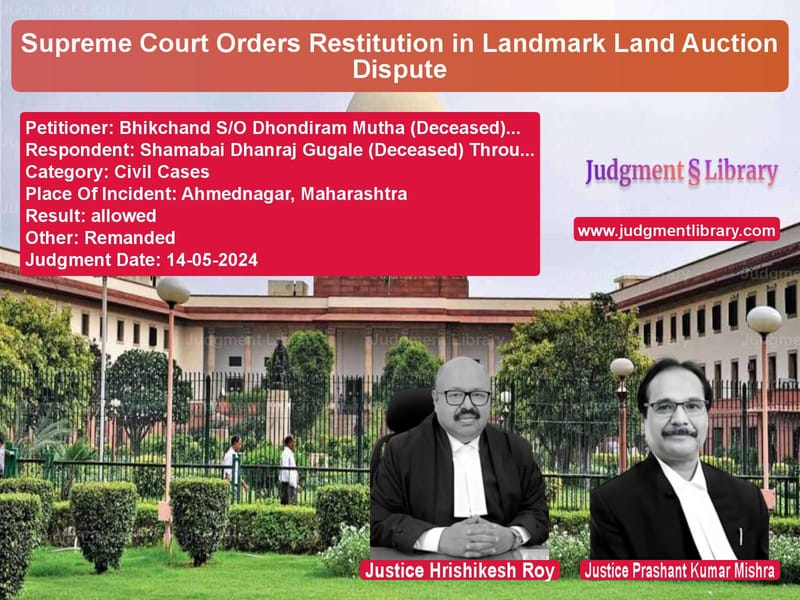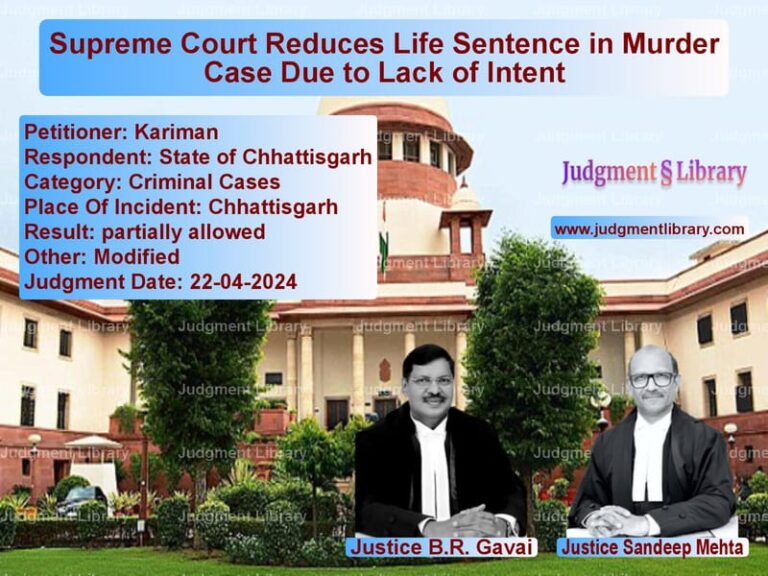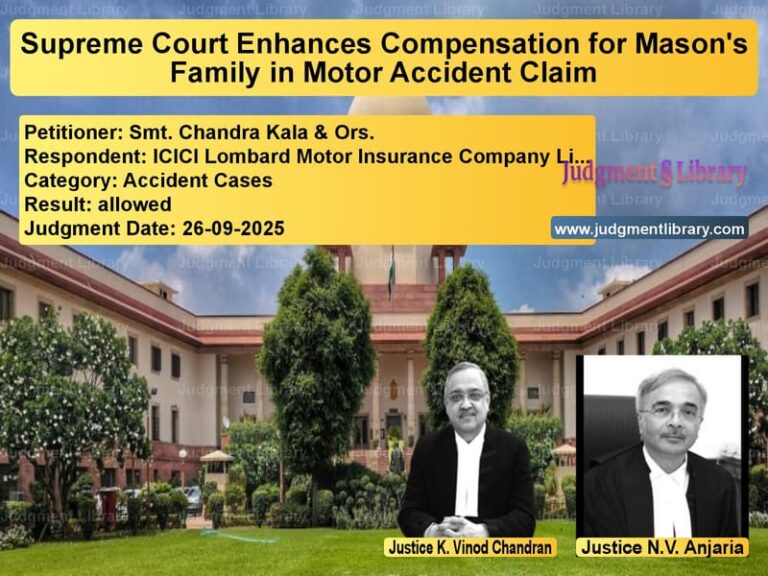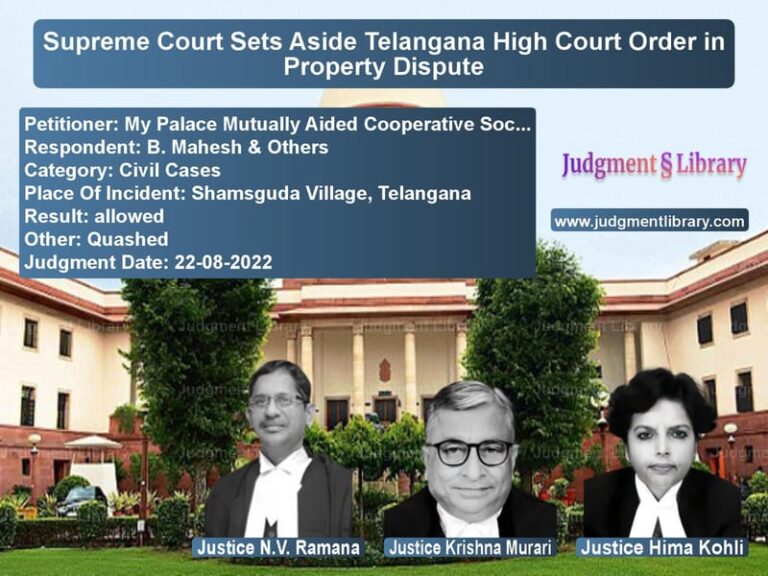Supreme Court Orders Restitution in Landmark Land Auction Dispute
The Supreme Court, in the case of Bhikchand S/O Dhondiram Mutha (Deceased) Through LRs. vs. Shamabai Dhanraj Gugale (Deceased) Through LRs., delivered a crucial ruling addressing the principles of restitution under Section 144 of the Civil Procedure Code (CPC). The case revolved around an auction sale executed under a decree that was later modified, leading to a dispute over whether the judgment debtor was entitled to restitution.
Background of the Case
The dispute dates back to 1969 when the original plaintiff, Shamabai Dhanraj Gugale, lent Rs. 8,000 to the defendant, Bhikchand Mutha. Upon his failure to repay, a civil suit was filed, and a decree was passed in 1982 awarding the principal amount plus interest at 12% per annum. However, before the appeal court could modify the decree, the decree was executed by auctioning the defendant’s property, which the plaintiff-decree holder himself purchased.
Read also: https://judgmentlibrary.com/supreme-court-orders-fresh-hearing-in-bihar-land-compensation-dispute/
After the appellate court reduced the interest rate from 12% to 6%, effectively reducing the total payable amount from Rs. 27,694 to Rs. 17,120, the judgment debtor sought restitution, arguing that the auction should be reversed. The lower courts rejected this request, leading the judgment debtor to appeal to the Supreme Court.
Key Legal Issues Considered
- Whether restitution under Section 144 CPC applied when a decree was modified but not entirely reversed.
- Whether the decree-holder, who himself purchased the auctioned property, could be treated as a bona fide purchaser.
- Whether a third-party buyer of the auctioned property, despite knowing the ongoing litigation, had any legal right to retain ownership.
- Whether the entire attached property should have been auctioned when only part of it was sufficient to satisfy the decree.
Arguments by the Petitioner (Judgment Debtor)
The petitioner’s counsel contended:
- The decree holder should not be entitled to equity as he himself purchased the property in the auction.
- The sale was unjustified as the property was worth Rs. 1,05,700 while the decree amount was only Rs. 27,694.
- The subsequent sale of the auctioned property to a third party, despite the ongoing legal proceedings, should not grant the buyer any protection.
- The courts failed to consider that under Order XXI Rule 64 CPC, only the necessary portion of the property should have been sold.
Arguments by the Respondent (Decree Holder & Subsequent Buyer)
The respondents countered:
- The judgment debtor failed to deposit any amount to satisfy the decree before the auction, so restitution was not warranted.
- The subsequent buyer of the auctioned property was a bona fide purchaser and should not be penalized.
- The decree modification did not nullify the auction, and the judgment debtor should only be entitled to recover the excess amount, not reverse the sale.
- The auction was conducted lawfully, and any objections should have been raised earlier.
Supreme Court’s Findings
The Supreme Court analyzed the applicability of Section 144 CPC and relevant case laws on restitution and auction sales.
1. Application of Restitution Under Section 144 CPC
The Court reaffirmed that restitution is a principle of justice, equity, and fair play. It cited:
- South Eastern Coal Fields Ltd. vs. State of M.P. – Restitution ensures that parties are restored to their original positions if a decree is reversed or modified.
- Binayak Swain vs. Ramesh Chandra Panigrahi – If a decree-holder himself is the auction purchaser and the decree is later modified, restitution must be granted.
2. Decree Holder as an Auction Purchaser
The Court held that when the decree holder himself purchases the auctioned property, he is not entitled to the same protection as a third-party bona fide buyer. It ruled:
“When a decree-holder purchases the property in execution of his own decree, which is later modified, he must restore the property to the judgment debtor.”
3. Rights of Third-Party Buyers
The Court found that the subsequent buyer had full knowledge of the ongoing litigation, as evidenced by a clause in the sale deed that required the original decree-holder to refund the purchase price if the decree was overturned. It ruled:
“A third-party purchaser who knowingly buys property under litigation cannot be treated as a bona fide purchaser and has no right to resist restitution.”
4. Failure to Sell Only the Necessary Portion of the Property
The Court noted that under Order XXI Rule 64 CPC, an auction should only sell as much of the property as necessary to satisfy the decree. Here, the attached properties were worth Rs. 1,05,700, but the decree was only Rs. 27,694. The Court ruled:
“The Executing Court erred in selling the entire property instead of a portion sufficient to satisfy the decree. This violated the mandatory provisions of Order XXI Rule 64 CPC.”
Final Ruling
The Supreme Court set aside the execution sale and ordered:
- The attached properties be restored to the judgment debtor.
- The decree be executed only to the extent of the modified amount.
- The subsequent buyer’s claim be dismissed as he knowingly purchased disputed property.
Implications of the Judgment
- Strengthens Protection Against Unfair Auctions: Ensures that only necessary portions of property are auctioned.
- Limits Abuse of Execution Sales: Prevents decree holders from using auctions for windfall gains.
- Clarifies Rights of Third-Party Buyers: Establishes that those aware of pending litigation cannot claim protection.
Conclusion
This ruling reinforces the principle that restitution is a fundamental right when a decree is modified. It prevents decree holders from unfairly benefiting from execution sales and ensures that justice is served through proper judicial oversight.
Petitioner Name: Bhikchand S/O Dhondiram Mutha (Deceased) Through LRs..Respondent Name: Shamabai Dhanraj Gugale (Deceased) Through LRs..Judgment By: Justice Hrishikesh Roy, Justice Prashant Kumar Mishra.Place Of Incident: Ahmednagar, Maharashtra.Judgment Date: 14-05-2024.
Don’t miss out on the full details! Download the complete judgment in PDF format below and gain valuable insights instantly!
Download Judgment: bhikchand-so-dhondi-vs-shamabai-dhanraj-gug-supreme-court-of-india-judgment-dated-14-05-2024.pdf
Directly Download Judgment: Directly download this Judgment
See all petitions in Contract Disputes
See all petitions in Property Disputes
See all petitions in Damages and Compensation
See all petitions in Judgment by Hrishikesh Roy
See all petitions in Judgment by Prashant Kumar Mishra
See all petitions in allowed
See all petitions in Remanded
See all petitions in supreme court of India judgments May 2024
See all petitions in 2024 judgments
See all posts in Civil Cases Category
See all allowed petitions in Civil Cases Category
See all Dismissed petitions in Civil Cases Category
See all partially allowed petitions in Civil Cases Category







